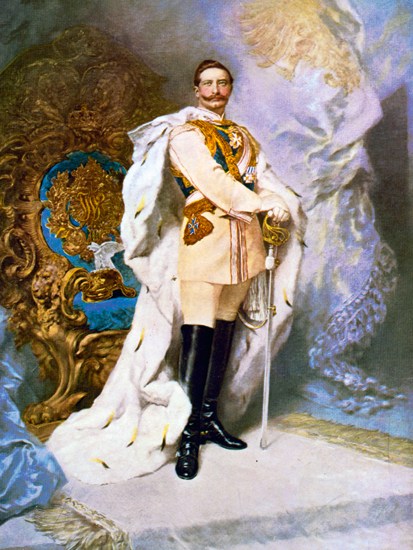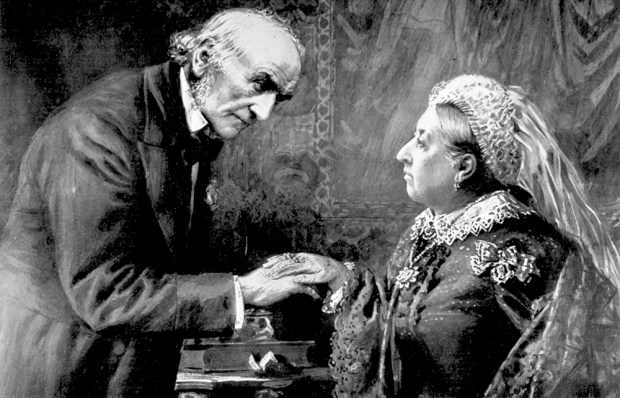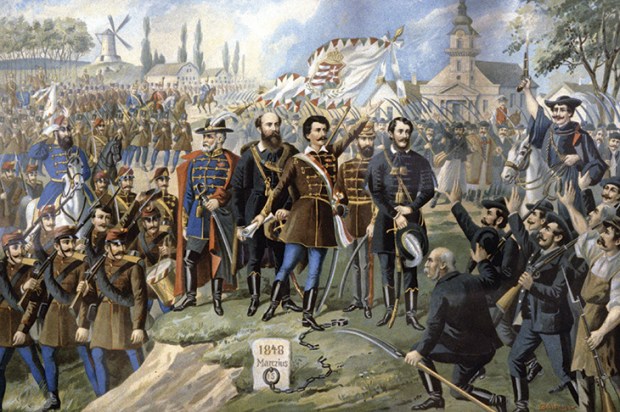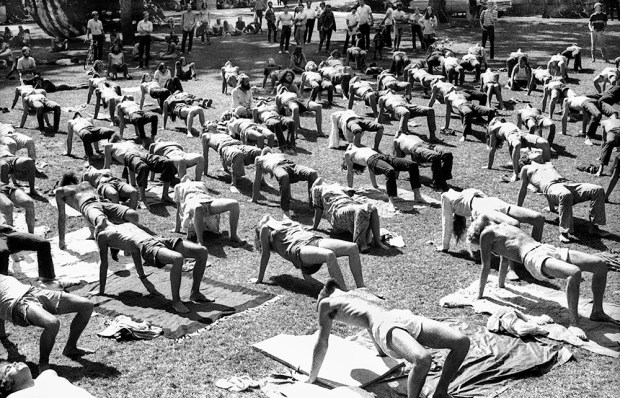The role of personality in politics is the theme of this awe-inspiring biography. This is the third volume, 1,562 pages long, of John Röhl’s life of the Kaiser. It has been brilliantly translated — the labyrinth of imperial Germany navigated by many headed subdivisions in each chapter — by Sheila de Bellaigue.
The fruit of what Röhl calls a ‘dark obsession’ with the Kaiser, it had its origin when, writing about Germany after the fall of Bismarck at the apogee of social and institutional history in the 1960s, he realised that he was analysing not a modern government but a court society. Personalities and dynasties were as important as classes and parties. One of the outstanding biographies of the past 20 years, based on research in almost as many archives as the Kaiser had palaces, it is also a guide to how to ruin a country.
This volume deals with the years from 1900 to the Kaiser’s death in exile in the Netherlands in 1941. Behind Germany’s façade of parliamentary government, with the most advanced economy in Europe (by 1914 twice as many books were published in Germany as in France), considerable power remained with the Kaiser and his private military, naval and civil cabinets. He could appoint the Chancellor, ambassadors and generals. As he wrote to his first cousin George V in 1912, ‘They have to obey and follow my will.’ Germany did not make ministers responsible to the legislature rather than the monarch until October 1918 — in a last-minute attempt to win better peace terms, rather than a sudden enthusiasm for constitutionalism.
Journeys reveal power structure. The Chancellor travelled to remote royal hunting lodges — Rominten, Springe, Hubertusstock, even to the Kaiser’s villa in Corfu — in order to consult his master. One of the Kaiser’s closest friends, Prince Philipp zu Eulenburg, provoked public exposure as a homosexual by returning to Germany in January 1907 to be received into the Order of the Black Eagle in the Schlosss in Berlin. He risked everything to attend a court function.
Admirers of Prince Charles’s speeches might reflect on the damage inflicted by the Kaiser’s indiscretions on his country, his monarchy and himself. From the start of his reign, he said ‘I’ instead of ‘my government’. After 1899 this forceful, volatile, controversy-courting ruler was openly attacked in a way other German monarchs were not. Every imperial speech, August Bebel said, to gales of laughter in the Reichstag, won 100,000 votes for the socialists.
Germany’s ruin was long foretold. General Count Waldersee wrote in 1900, ‘the Kaiser ruins everyone he deals with.’ Germany was heading for ‘a bad end’. In April 1904 Baroness von Spitzemberg wrote in her diary that the Kaiser was ‘leading glorious Germany into disaster, unless God helps us!’
After an especially indiscreet interview with the Kaiser, printed by the Daily Telegraph in 1908, which Röhl thinks was intended to lull England while Germany built up its navy, the Reichstag passed a unanimous vote of censure against his personal rule. A few weeks later, staying with Prince Furstenberg in Donaueschingen, the Kaiser and his household were entertained by General von Hülsen-Haeseler, head of his military cabinet, dancing in their hostess’s ball-gown, blowing kisses to the guests — until a heart attack left him dead at his master’s feet. The Kaiser’s subsequent nervous collapse lasted several weeks.
When he wanted he could be — wrote his cousin Queen Mary — ‘charming and agreeable’. Churchill admired his ‘easy grace’. In 1913 he boasted that his reign had seen 25 years of peace. Below the surface, however, Wilhelm II was anachronistic, racist and militaristic even by the standards of his day. He told troops going to China to ‘take no prisoners’. His belief that a ‘final struggle’ between Germans and ‘Slavdom’ was inevitable explains his blank cheque to Austria in 1914. After 1909, despite his friendships with ‘Kaiserjuden’ such as Albert Ballin, the Hamburg shipowner who named his liners Imperator or Vaterland, Wilhelm II’s youthful anti-Semitism revived. There were few Jewish officers in the Prussian army.
The Kaiser’s militarism was not limited to words. Like the Schlieffen plan to invade France through neutral Belgium (thereby making Britain’s entry into the war inevitable), Germany’s battle fleet was a personal project. It too drove Britain to ally with France (the Royal Navy could better defend the North Sea if it left the Mediterranean to the French navy). The Zabern incident on 28 October 1913 showed that age had not sobered the Kaiser. When German officers and soldiers insulted and arrested Alsatian civilians, Wilhelm II publicly commended their ‘energy’. The Chancellor proclaimed ‘the King’s uniform must be respected in all circumstances’. There were also schemes, detailed here, to attack New York, invade South America or dominate the Muslim world.
Nevertheless the Kaiser could be manipulated by the men around him. As an old Prussian proverb went: und der konig absolut, wenn er unsern willen tut (‘let the King be absolute, as long as he does what we want’). Röhl shows that the Kaiser was not as war-hungry as his family and some of his countrymen. Some had called him, when he had preferred diplomatic solutions, ‘Guillaume le timide’, ‘the hope of France’. In the crucial days 28–30 July 1914, keen on war with France and Russia but alarmed that Britain would join them, the Kaiser hesitated. Convinced that it was ‘militarily more favourable than it can ever be again for the foreseeable future’ — since Russia was growing stronger and Austria weaker — the Chancellor Bethmann-Hollweg and the generals wanted war ‘the sooner the better’. They held back or distorted letters to and from the Kaiser in order to hasten war’s outbreak.
By uniting Germany, and acquiring Alsace-Lorraine by force, Bismarck had fatally increased the power of the army — and ensured that France would plan revenge. Recent books by Christopher Clark and Sean McMeekin show that the French, Russian and Serbian governments were as belligerent as the German and Austrian. The Russian ambassador in Belgrade, Hartwig, like the Serbian prime minister Pasic, whom he met almost daily, knew of plans to kill Archduke Franz Ferdinand. President Poincaré, a man from Lorraine known to some as Poincaré-la-guerre, expressed relief when war broke out — soon after his return from a triumphant visit to Saint Petersburg. The leaders of 1914 were not ‘sleepwalkers’ but warmongers. The Kaiser’s popularity reached its height when he proclaimed, from the balcony of the Berlin Schloss (now, incredibly, being rebuilt) mobilisation on 1 August 1914. Beaming faces everywhere in the war ministry; cheering crowds in the streets.
Thereafter the Kaiser, although still a central factor, became hesitant and reactive. ‘The general staff tell me nothing,’ he complained. He was further incapacitated by a swollen scrotum. Unlike other monarchs, he rarely visited troops at the front. The head of his military cabinet wrote: ‘His own comfort and amusement always come first… one day we shall have to pay for all of this.’ That day came in November 1918.
‘Completely exhausted and battle-weary’, German troops were ‘quite indifferent’ to his fate. From military headquarters where he had retreated to avoid unrest in Berlin, on 9 November 1918 the Kaiser was led by his generals to exile in the neutral Netherlands, as one of them wrote, ‘just as if he was a little child’. In exile meetings between monarchists and Nazis — Goering twice went to see the Kaiser — were frequent. The Kaiser advocated in private letters exterminating Jews and prayed for the destruction of ‘Juda England’, before his death in Doorn in 1941. It is impossible to disagree with Röhl’s conclusion that the Kaiser’s long and belligerent life personified ‘the numerous continuities between the Wilhelminian era and the Third Reich’. He hastened Germany’s self-destruction.
This great biography shows how a dynamic modern country can be ruined by nationalism and militarisation. Phrases resembling the Kaiser’s ‘the sword is forced into our hands’, doctrines of ‘preemptive’ or ‘preventive’ war and the primacy of ‘security’ are used to justify wars in the 21st century just as they were in 1914. What Röhl calls ‘phobic hyper-nationalism’ is on the rise from Moscow to Glasgow. Militarism is as dangerous as terrorism.
Got something to add? Join the discussion and comment below.
Get 10 issues for just $10
Subscribe to The Spectator Australia today for the next 10 magazine issues, plus full online access, for just $10.
Available from the Spectator Bookshop, £42.50, Tel: 08430 600033. Kaiser Wilhelm II, a concise edition, will be published as a paperback original later this month (CUP, £16.99, pp. 240, ISBN 9781107420779). Philip Mansel’s books include Louis XVIII, Paris Between Empires, 1814–1852 and The Eagle in Splendour: Napoleon I and His Court.
You might disagree with half of it, but you’ll enjoy reading all of it. Try your first month for free, then just $2 a week for the remainder of your first year.














Comments
Don't miss out
Join the conversation with other Spectator Australia readers. Subscribe to leave a comment.
SUBSCRIBEAlready a subscriber? Log in